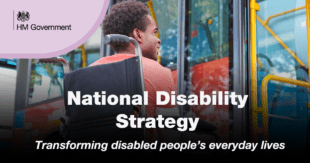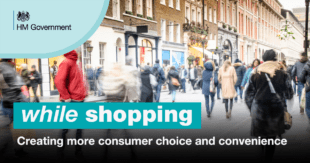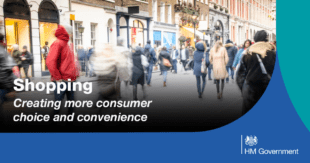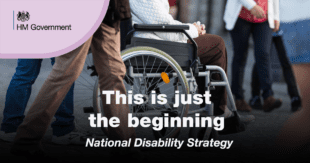We have published the Government’s National Disability Strategy.
Over one in five people in the UK are disabled.
'What does disability mean to me? The usual connotations - I find it harder to do certain things than others would. I see things differently. I don’t struggle. I have just spent my life finding efficient ways of getting round the challenges I’ve had.'
-Beth
Our vision is to transform the everyday lives of disabled people by tackling the barriers people face. So we can build back better towards a society that works for everyone. The strategy sets out immediate actions we will take on our path towards a longer-term goal, rooting the strategy in the everyday experience of disabled people.

This series explains the strategy’s eight key themes, and how we are making improvements to every part of a disabled person’s day. From the moment someone gets up to the moment they end their day.
Shopping: Creating more consumer choice and convenience

Too often, disabled consumers experience hard to navigate high street store layouts, inaccessible special offers, cluttered websites with difficult to read text and a retail workforce not yet routinely delivering excellent customer service to meet their needs.
Many businesses on UK high streets are still inaccessible for disabled consumers. The buildings that disabled respondents to the UK Disability Survey had most frequently been unable to access or had extreme difficulty accessing were shops and shopping centres (78%), and pubs, bars, restaurants and cafes (66%).
Shopping online can be a similarly frustrating experience. 98% of the million most visited web pages did not meet accessibility standards and 69% of disabled internet users click away from sites with barriers.
Transforming the accessibility of our towns and high streets
‘If I’m using my scooter or wheelchair to mobilise around or even on crutches, I find that the actual physical space between in aisles and between, you know, garment rails are either too high, around the shop, there’s not enough accessibility to get round at all.’
-UK Disability Survey respondent
We want our high streets and town centres to be welcoming and accessible for everyone. Yet for many disabled people, they can be an obstacle course.
Responding to the UK Disability Survey, nearly a third (31%) of disabled people found using public spaces difficult ‘all the time’ or ‘often’.
This is not only a social injustice but a potentially huge loss to high street businesses. One estimate puts the spending power of disabled people and their families at £274 billion.
DfT issues guidance for local authorities and other organisations in England, which is also referred to in devolved administrations, on accessible pedestrian and transport infrastructure. We will strengthen our guidance in 2021.
Driving innovation in assistive technology
‘Because we couldn’t work out doing an online food shop, we just couldn’t get the technology. Our devices that we had at the time were just not conducive for trying to do a food shop on it. And then once you got on, there were no spaces, no delivery slots. So, we quickly gave up with that.’
-Jessica
Technology offers a range of potential solutions to many of the everyday challenges that disabled people face. The impact of products that support everyday tasks is huge. Over three quarters (78%) of disabled people find access to mobile technologies helpful for living independently.
We have yet to take full advantage of the potential of technology to increase disabled people’s independence.

To champion disabled consumers and help make the UK the most accessible place in the world to live and work with technology, we will:
- make high streets more accessible;
- accelerate the delivery of Changing Places toilets in England;
- explore new assistive technologies;
- explore how to improve the accessibility of private sector websites; and
- appoint more business leaders to promote accessibility in their sectors.
We want to do more in the longer term. The Disability Unit recognises the huge potential of action in this area and will prioritise further cross-government work in 2021/22. As a first step, we will improve our understanding of disabled people’s experiences accessing products and services in the UK. This will include commissioning research and exploring the extra costs some disabled people may face.
What are our next steps?
- The Department for Transport will update the Inclusive Mobility guidance and Use of Tactile Paving Surfaces guidance in 2021, and guidance on designing streets for people (Manual for Streets) in 2022.
- The Ministry for Housing, Communities and Local Government will make £30 million available from summer 2021 to accelerate delivery of Changing Places toilets in existing buildings in England.
- The Department for Business, Energy and Industrial Strategy will challenge UKRI and other research stakeholders to use future innovation challenges to accelerate innovation in assistive technologies.
- The Disability Unit is launching an enhanced and expanded programme of Disability and Access Ambassadors in summer 2021. The Unit will also explore whether a new Centre for Assistive and Accessible Technology can help accelerate assistive tech improvements.

This is only the beginning.
We see the National Disability Strategy as a dynamic plan that we will refresh regularly in response to disabled people’s priorities.
Join the conversation
- Sign up to our newsletter to hear what we’re doing.
- Follow us on Twitter to stay up-to-date with our plans.
Want to know more about the National Disability Strategy
Read about the other seven Strategy themes:
- Rights and perceptions: Removing barriers to participating fully in public and civic life and wider society
- Home: Creating more accessible, adapted and safer homes
- Transport: Improving the accessibility and experience of everyday journeys
- Jobs: Making the world of work more inclusive and accessible
- Education: Ensuring children and young people fulfil their potential
- Leisure: Widening access to arts, culture, sport and the great outdoors
- Public services: Making access as smooth and easy as possible
Leave a comment